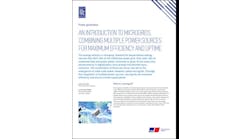Gary Leatherman, vice president, power advisory at Advisian, a part of Worley Group, discusses why industrials are exploring microgrids and how microgrid portfolio standards could propel the market forward.
Leatherman, who has been in the energy business for 35 years, manages Advisian’s power advisory in the company’s distributed energy and microgrid practices.
He explained that in the microgrid space, Advisian helps clients develop strategies around their microgrid development plans.
Interest in microgrids is rising in California and other states that are “trying to get their arms around resiliency” and meet climate goals, he said.
Check back for more Executive Interviews from Microgrid 2020 Global, published regularly on Microgrid Knowledge.
“There’s a lot of work there, helping them understand what microgrids are, how best to strategize about various facilities, determine what their requirements are, and then really trying to help them make informed decisions on what projects do and don’t make sense,” said Leatherman. “We’re really helping them with the decision and supporting information around the feasibility of these sorts of projects.”
In addition to cities and municipalities, industrial clients are increasingly interested in microgrids, according to Leatherman.
The company serves the extractive and petrochemical industries. Clients in those spaces seek microgrids, distributed energy and renewables to “green up” processes and transition toward a low-carbon economy.
“I was just working with a company — of all things, a coal mining company — earlier today, to help them get their operations a little greener,” Leatherman shared. “They mostly produce coal for metallurgical coke, but they are very serious about reducing the footprint of their operations.”
As for what could spur the microgrid industry forward — beyond its already growing customer base — Leatherman recommended a kind of renewable portfolio standard for microgrids.
“Microgrids bring a lot of benefit to society as a whole, and I think they’re really worthy of something akin to the renewable portfolio standard,” Leatherman said.
The microgrid industry is growing as the value of resiliency continues to spike with the impact of climate change and natural disasters such as flooding, wildfires and extreme storms, but “it could use a little bit of a jump-start,” he said. Establishing state microgrid standards similar to the renewable portfolio standards already in use today across many states could assist with this jump-start.
He noted that renewable portfolio standards helped drive down the cost of renewables. “The microgrid industry could really benefit from something like that,” Leatherman said.
Join us for the next Microgrid Knowledge conference: Microgrid 2021: The World Awakens to Microgrids, May 11-June 3. Virtual seats are limited. Register today.






